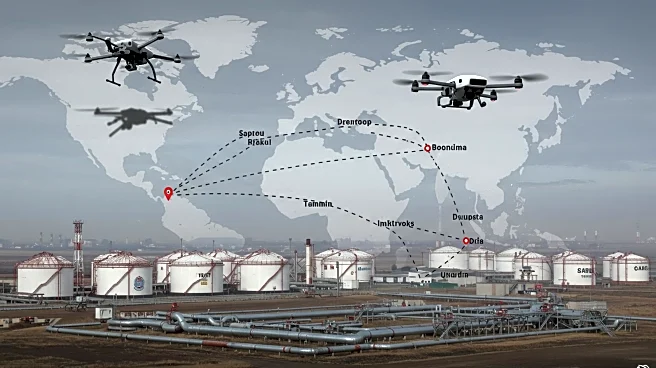What's Happening?
Ukraine has successfully halted operations of the Druzba pipeline, a major Russian oil export route to Europe, following a drone strike that disabled a key pumping station. The Ukrainian General Staff confirmed the shutdown on August 18, marking a significant disruption to Russia's fuel exports and affecting EU clients such as Hungary and Slovakia. The attack was carried out by Ukraine's Unmanned Systems Forces, targeting the Nikolskoe-1 oil station in Russia's Tambov Oblast, approximately 400 km from the frontline. This strategic move is part of Ukraine's ongoing efforts to use long-range drones to strike deep within Russian territory, focusing on military, defense-industrial, and fuel-related targets.
Why It's Important?
The shutdown of the Druzba pipeline represents a major blow to Russia's economy, as it disrupts the flow of oil to European markets, particularly impacting Hungary and Slovakia. This action underscores Ukraine's capability to target critical infrastructure within Russia, potentially altering the dynamics of energy supply in Europe. Hungary, which has maintained crude oil imports from Russia despite the ongoing conflict, faces significant supply challenges. The incident highlights the geopolitical tensions surrounding energy dependence and the strategic use of military technology in modern warfare.
What's Next?
The indefinite halt of the Druzba pipeline's operations may lead to increased diplomatic tensions between Hungary and Ukraine, as Hungary has criticized Ukraine's actions. Ukraine's Deputy Foreign Minister has suggested that Hungary should address its concerns with Russia, indicating potential diplomatic fallout. The situation may prompt EU countries to reassess their energy strategies and reliance on Russian oil, potentially accelerating shifts towards alternative energy sources or suppliers.
Beyond the Headlines
The attack on the Druzba pipeline raises questions about the security of energy infrastructure in conflict zones and the effectiveness of recent upgrades made by Russia to protect such facilities. The incident may lead to increased investment in security measures for critical infrastructure and influence future military strategies involving drone technology.









